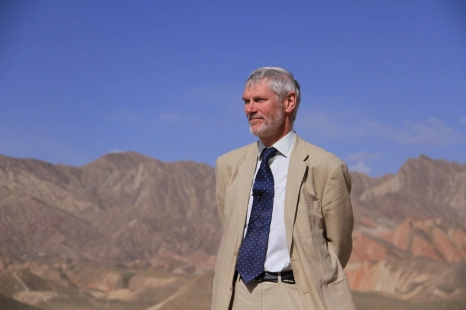News
The Importance of the World Conference on Sinology
Author:David Jasper

Member of the Executive Committee of the World Conference on Sinology; Emeritus Professor at the School of Humanities (Arts) and Divinity, University of Glasgow, UK; former Distinguished Overseas Professor at Renmin University of China; founding editor of Literature and Theology, a leading international journal in the interdisciplinary field of Literature and Theology.
The importance of intercultural scholarship and friendships has never been more important in our politically divided and war-torn world. The World Conference on Sinology is dedicated to such connections, its very title a reminder that sinology is not only the study of China and its cultural heritage, but an intellectual and scholarly activity on a global stage. The members of its Executive Committee come from every part of the world, forming friendships that extend in ever widening circles as new generations of students of sinology are encouraged to study in China and develop new love for and understanding of China in many academic disciplines. To learn about other cultures and histories is also a process of learning about ourselves and growing to become comfortable in our common humanity.
The study of the humanities through literature, history, religion, philosophy and many other related disciplines is under dire threat globally. Universities in many parts of the world are under severe strain financially and culturally, and they are not served well by models of competitiveness or by threats to their academic freedom to debate and think critically. If we fail to take seriously our humanity then the consequences will be a bleak future for those who come after us. One of the greatest gifts to me was the opportunity many years ago to come to China to study and teach, and perhaps above learn through growing friendships and living in a place that was at once familiar and strange and which I grew to love and respect. The World Conference on Sinology is bound together by scholars of world class renown whose voices within the humanities need to be heard far beyond student classrooms. The universities throughout the world that sustain through their scholars the work of the Conference lie at the very heart of our societies in China, India, Europe, north America, Australia and indeed throughout the world.
Sinology, as the study of ‘China’, covers many different fields of academic enquiry and never before have there been greater opportunities for scholars to make cultural openings between East and West for wider communities in our societies. There is no room here for unhealthy competitiveness or striving for power at the expense of others. Whether it be through language, literature, history or philosophy, China and its ancient culture offers limitless possibilities for understanding and growth in friendship and respect. In my own field of comparative literature, the result has been a significant development in the study of Chinese literature both ancient and modern in classes on world literature in European universities and this cannot but be a good thing in many ways. The growth in understanding and the making of new connections breed a new spirit of harmony and co-operation which will be vital for the next generation as a cultural antidote to unhealthy economic competition and ignorant fear of the ‘other’.
The World Conference on Sinology is perfectly well aware of the opportunities and dangers facing the next generation of scholars, not least sinologists. Cultural shifts have always been driven, in part at least, by developments in technology and the manner in which information and ideas are preserved and communicated. But technological change today moves at a faster speed than it has ever done before with all its threats and advantages. At this stage no-one really knows the full impact on our lives of the field of Artificial Intelligence (AI), not least in the field of the humanities in academic study. My reflection here is personal and does not represent in any way the voices of my colleagues in the World Conference, but it seems to me that in spite of its many genuine gifts to us in the fields of medicine, engineering and so on, AI cannot finally entertain the necessary, messy, loving world of human relationships as felt in body mind and soul – and we shall always need the wisdom of the Daodejing, the stories of Lu Xun or the art of Chinese landscapes, and students to read and study them both in China and throughout the world. Furthermore, sinology can never be simply a matter of ‘artificial’ intelligence, but will only flourish in the context of critical debate and discussion that is made possible and tempered by friendships that finally transcend all barriers of culture and history.
No-one in the world today can be unconscious of the manifold threats to our very survival and the survival of our world. Many of these threats are generated by human initiatives – which can and must be overcome. The World Conference on Sinology will not bring about world peace. But it does seek to foster a better understanding of China and its culture on a global scale and seek to bequeath that understanding to new generations of students and sinologists.
